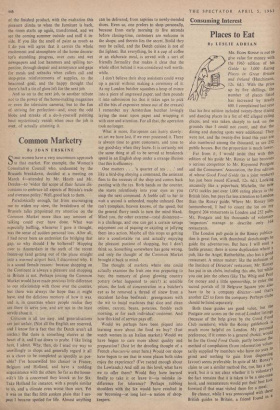Common Marketry
By JOAN ERSKINE
SoNtE women have a very uncommon approach to that market. For example, the Women's Consultative Council who, undaunted by the Brussels breakdown, decided at a meeting on March 4—attended by Mr. Heath and Mr. Deedes—to 'widen the scope of their future dis- cussions to embrace all aspects of Britain's trade and overseas policy.' Well, good luck to them.
Paradoxically enough, far from encouraging me to widen my view, the breakdown of the Brussels talks pinpointed my attention on the Common Market more than any amount of talking could ever have done. What was especially baffling, whenever I gave it thought, was the sense of sudden personal loss. After all, I had never been an enthusiast for bridging that gap, so why should I be bothered? Hopping over to Amsterdam in the teeth of the recent freeze-up (and getting out of the plane straight into a warmed airport bus), I discovered why. It is a sound female reason: because shopping on the Continent is always a pleasure and shopping in Britain is not. Perhaps joining the Common Market would have made precious little difference to our relationship with those over the counter, but there was always the hope that it might have, and the delicious memory of how it was, and is, in countries where people realise they are there to serve you, and are not in the least servile about it.
Criticism is all too easy, and generalisations are just unfair. (Not all the English are reserved, and I know for a fact that the Dutch aren't all uncles.) But there is something elusive at the heart of it, and I sat down to probe. I like living here, I admit. Why, then, do I snail my way so unwillingly to shops and generally regard it all as a chore to be completed as speedily as pos- sible? I've housewifed (no choice) in France, Belgium and Holland, and have a nodding acquaintance with the others. So far as the house- wife's life is concerned they knock us for Six. Take Holland for instance, with a people similar to us, and a climate even worse than ours. Yet it was on that flat little sunken plain that I sus- pect I became spoiled for life. Almost anything can be delivered, from aspirins to newly-mended shoes. Even so, one prefers to shop personally, because from early morning to five seconds before closing-time, customers are welcome in the shops; and therein lies the secret. Stolid they may be called, and the Dutch cuisine is not of the lightest. But everything, be it a cup of coffee or an elaborate meal, is served with a sort of friendly formality that makes it clear that the whole effort behind it was considered well worth- while.
I don't believe their shop assistants could wrap up a parcel without making a ceremony of it. As my London butcher squashes a heap of mince into a piece of ungreased paper, and then pounds it into submission (so that it takes ages to pick all the bits of expensive mince out of the creases) I remember my Amsterdam butcher lovingly laying the meat upon paper and wrapping it with care and attention. For all that, the operation took no longer.
What is more, Europeans can hurry slowly: an art we have lost, if we ever possessed it. There is always time to greet customers, and time to say good-day when they leave. It is certainly not the same thing at all to be served at breakneck speed in an English shop under a strange illusion that this is efficiency.
One mutters . . . 'a quarter of tea . . .' and like a bird-dog obeying a command, the assistant flees to the recesses of the shop and comes back panting with the tea. Both hands on the counter, she stares relentlessly into your eyes as you snap the next command. A feeble call to her to wait a second is unheeded, maybe unheard. One can't complain, heaven knows, of the speed, but the general flurry tends to turn the mind blank. Mind you, the other extreme—total disinterest— is a challenge, and one can get a certain savage enjoyment out of piquing or cajoling or jollying them into action. Maybe all this stops us getting into a comfortable rut and actually enjoying the pleasant pastime of shopping, but I don't think so. Something somewhere has gone wrong, and only the thought of the Common Market brought it back to mind.
The thought of markets where one could actually examine the fruit one was preparing to buy; the memory of glossy glowing country pottery (what happened to ours?) at sensible prices; the look of concentration in a butcher's eye as he removed a thread of sinew from a succulent fat-free beefsteak: greengrocers with the wit to instal machines that slice and clean onions, carrots, beans, potatoes, freshly each morning, or for each individual customer. And how this kind of service pays off.
Would we perhaps have been piqued into learning more about the food we buy? (Just watch women in an Italian market.) Would we have begun to care more about quality and preparation? (Just let the drooling thought of a French charcuterie enter here.) Would our shops have begun to see that in some places both-sides enjoy the experience? (I've ranted enough about the Lowlands.) And still on this level, what have we to offer them? Would they have learned finally to take it or leave it—to mistake in- difference for tolerance? Perhaps rubbing shoulders with the Six would have resulted in our becoming—at long last—a nation of shop- keepers.


































 Previous page
Previous page